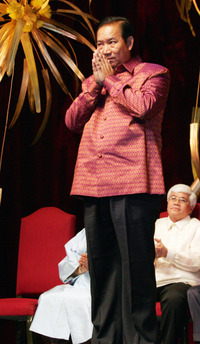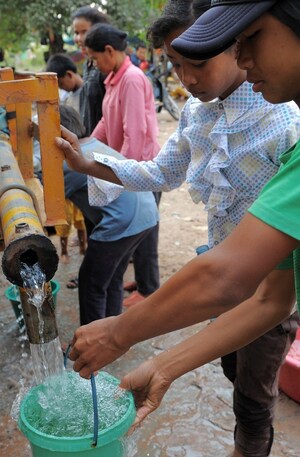The sound of running water — clean running water — is not one you have always been able to hear in the ramshackle lean-tos that pass for homes on the edge of Phnom Penh, the capital of Cambodia.
Providing clean water is one of the biggest challenges for governments in the developing world. Clean water charities say thousands of people die every day of preventable diseases as a result of not having clean drinking water, and 90 percent of those who die are younger than 5.
But in recent years, Phnom Penh has been leading the way: The city has managed to provide clean running water to almost the entire urban population.
Cleaner, Cheaper Water
The lean-to homes on the city's edge are small and dark. Inside one, a few boards separate the single bedroom from the main living space. The corrugated iron roof leaks light onto the dirty floor. But here, 60-year-old Khive Thol is drinking water from the tap.
She says she used to have to boil water from containers. She bought the water from a truck that came around every week, she says. She doesn't know where the water came from — probably from the river, she adds.
Khive Thol used to pay $1 a day for dirty, dangerous water. Now she pays about $4 a month for a faucet in her own home — and so do all of her neighbors.
The successes here are largely due to the work of one man and one organization: 61-year-old Ek Sonn Chan and the Phnom Penh Water Supply Authority he heads.
"In 1994, we had to sit down with international funds agencies for five days to seek $10 million assistance from them because performance [was] so bad," Chan says. "Now we can stay here and people come to knock [on] your door and ask you, 'Do you need money?' It's completely different."
Chan says that in 1993 — after four years of rule by the Khmer Rouge and 10 years of occupation by the Vietnamese — only 25 percent of the city had running water, and most of those who had it didn't pay for it. The old pipes leaked, or the water was siphoned off and stolen. Now, 92 percent of households in Phnom Penh have clean running water — a phenomenal feat in such a poor country.
Chan says almost everyone pays on time. If Phnom Penh can do it, he says, it's possible anywhere.
"I believe 100 percent that solving water problems [for] everyone in this world is 100 percent possible," Chan says. "It's not the problem of scarcity of water resources; it's not the lack of financing, but because of [the] lack of good governance."
Impressive Success
 |
| Ek Sonn Chan |
At one point, a Cambodian general who objected to the scheme held a gun to Chan's head, refusing to pay. But with the help of politicians who supported his scheme, Chan won over all levels of the city.
World water experts have nothing but good to say about him and the PPWSA. Per-Arne Malmqvist, a water expert at the Stockholm International Water Institute in Sweden, says they have succeeded in doing something that even cities in the Western world have not succeeded in.
"What they have done is impressive in itself, and the circumstances [are] even more impressive," Malmqvist says. "It's not only about technicalities — constructing pipelines and water works — it's also the management of the system, fighting corruption and having people to pay for the water which, of course, is very important."
More Work To Be Done
But Phnom Penh is just 1.7 million people in a country of more than 14 million. In rural Cambodia, like one small village near the town of Battambang, they have radios, they often have cellphones, but they frequently still don't have running water.
Sok Hoen, 48, makes $2 a day selling firewood. He lives in what can only be described as a hovel. Mosquitoes buzz, dogs doze on the dirt floor, and outside are three large jars filled with filthy brown water.
"That's the water we drink," he says. "We have to. We put tablets in it to try to purify it, but still we get sick," he says.
Multiply his plight by millions for all the rural households across Cambodia, and across the world.
Chan says he has written on a piece of paper above his bed that he will not rest until all of Cambodia has clean running water. He has made an impressive start, but there is still a long, long way left to go.


No comments:
Post a Comment